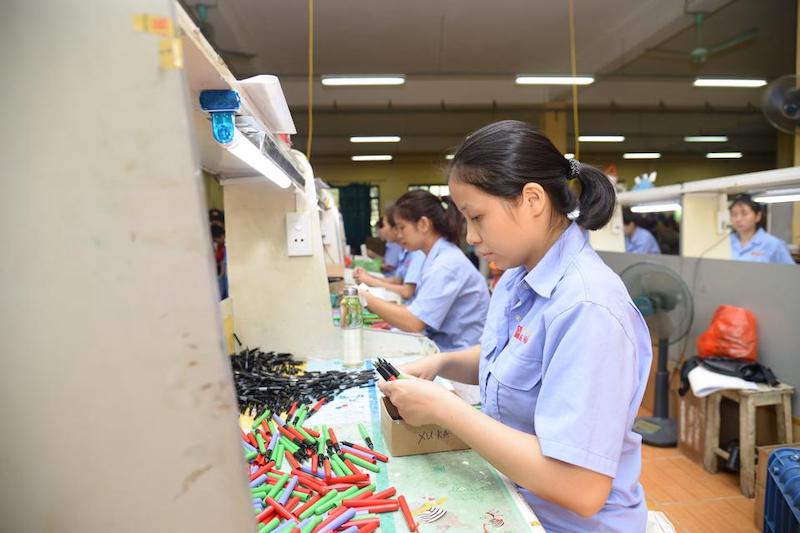Vietnam's labor market soars with 51.7 million employed in Q1
Vietnam's labor market is anticipated to exhibit positive signs of recovery in 2024, although it may not fully revert to pre-Covid-19 levels.
Vietnam saw an employment figure of 51.7 million people in the first quarter, marking an increase of 217,000 compared to the previous quarter, according to the Ministry of Labour, Invalids and Social Affairs.
| Manufacturing companies will need to hire in Q1 2024. Photo: Pham Hung/ The Hanoi Times |
According to the ministry, companies are receiving new orders, expanding operations, and starting major projects, leading to an increase in hiring needs. Three industries with increased employment opportunities are manufacturing and food processing (up 1.8%), electrical equipment manufacturing (up 1.6%), and leather and related products manufacturing (up 1.6%).
Vu Quang Thanh, deputy director of the Hanoi Center for Employment Services, said that despite the socio-economic distress, there are signs that the Hanoi labor market will continue to recover, with employment increasing and the jobless rate falling compared to the beginning of the year. Most industries will need to hire.
It is estimated that local businesses in the city will need to recruit around 100,000 - 120,000 workers from late 2023 to early 2024, he said, adding that trade and services will see a surge in hiring (around a 20% increase compared to the previous period). Sectors related to manufacturing, industrial processing, electronics, textiles, footwear, and construction will also witness an increase in hiring (around 10-15%).
"There will be sustained high recruitment demand in the science and information technology sectors, driven by the global trend. In addition, the real estate sector, which remained stagnant in the first half of 2023, will see a notable recovery in recruitment demand," Thanh said.
In Ho Chi Minh City, the Center of Forecasting Manpower Needs and Labor Market Information has projected that for the first quarter of 2024, there will be about 77,500 to 86,000 vacancies to be filled. The trade and services sector accounts for 72.63% of the labor market, followed by industry and construction at 27.23%, while agriculture, forestry, and fisheries account for 0.14%.
Navigos Search's 2024 Salary and Labor Market Report reveals that nearly 60% of the companies surveyed plan to hire less than 25% of their payroll in 2024. Nearly 100 companies plan to increase their workforce by 25-50%. A small proportion of companies need seasonal or freelance workers. Just over 1% of companies plan to hire more than 75% of their headcount.
The survey was conducted in the third quarter of 2023 and involved 550 companies and more than 4,000 job seekers in 23 industries in six provinces and cities: Haiphong, Hanoi, Danang, Binh Duong, Dong Nai, and Ho Chi Minh City.
Policy changes needed for job security
| Job seekers at a job fair in Hanoi. Photo: Tran Oanh/ The Hanoi Times |
Dr. Pham Thi Thu Lan, deputy head of the Institute for Workers and Trade Unions under the Vietnam General Confederation of Labor, told Voice of Vietnam radio that Vietnam's labor market is expected to show positive signs of recovery in 2024, but may not return to pre-Covid-19 levels.
She referenced a survey conducted by Navigos Group, a human resources recruitment service provider, which revealed that 10-20% of workers across all industries have transitioned to different sectors, while 30-50% of workers at various levels are contemplating changing jobs.
Another feature of the labor market highlighted by Dr. Lan is the proliferation of employment opportunities through social platforms, such as transportation, delivery services, domestic help, and repair services.
In addition, the uneven distribution of the labor force across regions and economic sectors leads to an imbalance between labor supply and demand. The current scale of technical labor training does not meet the needs of the labor market and is much lower than that of higher education and vocational training.
Dr. Lan suggests that in 2024, relevant authorities must adopt a revised approach to labor-related policies and job security for workers. Vietnam's labor laws should be updated and expanded to offer increased protection not only for contract workers but also for freelancers, part-time workers, and those in the informal sector. She recommends strengthening the state's role in formulating labor market policies, such as ensuring employment security, aligning supply and demand, and promoting labor productivity.
Minister of Labor, Invalids, and Social Affairs Dao Ngoc Dung acknowledges the persisting complexity of the global situation in 2024 and anticipates continued economic challenges.
Nevertheless, Vietnam's labor market is showing steady progress.
He emphasizes that 2024 marks a year of accelerated efforts and breakthroughs for the Ministry of Labor, Invalids, and Social Affairs, with the inauguration of the National Employment Exchange Floor scheduled for the first quarter of this year among the highlights.













